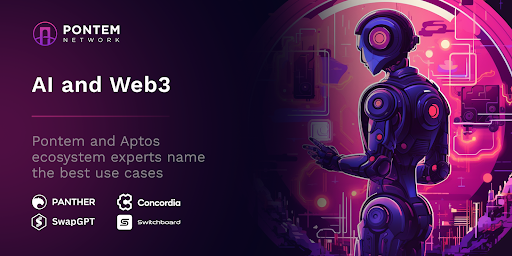Pontem CEO: Eventually smart contracts won’t need human input, but we can’t hand over the keys to AI yet
AI-powered products have become the new frontier of Web3, with the blockchain AI market expected to grow to $1.9 billion by 2030. Among the major L1 blockchains, Aptos is one of the first to commit to building AI-enabled solutions: on August 9, Aptos Labs announced a partnership with Microsoft, the parent company of OpenAI. Together, Aptos and Microsoft will explore the use of AI for smart contracts and onboarding experiences.
Not everyone is convinced that machine learning and Web3 are a good match: Yearn.finance creator Andre Cronje famously noted that “AI and blockchains don’t mix”. Thomas Ruble, CEO of Concordia (a multi-chain risk and collateral management protocol on Aptos), is also of the opinion that much of the enthusiasm around AI in Web3 is but “hype and narrative”.
However, Pontem Network CEO Alejo Pinto expressed a more positive view: AI can have a seismic impact in Web3, but a conservative approach and a lot of supervision are needed at first.
“AI will be ubiquitous in all interactions of the web: I wouldn’t be surprised if eventually LLMs replace graphical user interfaces (GUI). But in Web3, we can’t just hand over the keys to AI to drive, as real monetary value is at stake.
Humans need to make sure sound decisions are being made based on accurate data, because once a smart contract is executed, there’s no going back. Once this issue has been cleared, I do think most smart contracts will probably have little to no human input and we’ll see an economy of self-optimizing algorithms interacting with each other on blockchains.”
Pontem Network is the studio behind the popular Pontem Wallet for Aptos and the Liquidswap DEX. It is partnered with most major projects in the Aptos ecosystem, including Concordia, Panther Protocol, Switchboard, Pyth, and Sentio. Pontem’s team approached all these projects to know their takes on the prospects of AI in the blockchain industry and the associated risks.
Find out more about Pontem Network products
AI risks and limitations
LLMs may one day help onboard the first billion users to Web3 – but they are nowhere near there yet. First, there is the issue that AI has trouble distinguishing true and false information. There are no model training datasets labeled for different degrees of truth – especially in crypto, where paid content often praises protocols and coins of doubtful value.
Pontem CTO Boris Povod says,
“Think of today’s AI models as supercharged bookworms: they will devour any content they find. Books, articles, even tweets – everything goes. But, unlike us humans, an LLM can’t exercise critical judgment. If it reads a fairy tale, it won’t know that it’s fictional. Imagine that your AI crypto “assistant” starts taking investing advice from a random Twitter account and then suggests that you buy some risky coins shilled by dodgy influencers.
The takeaway is that AI can play the role of an advisor, a consultant, but not that of a CEO. You can let it pitch ideas to you – but always vet them yourself.”
Teaching Web3 AI models to tell objective content from cheap shills will take time and resources. Another limitation is the impossibility to build fully on-chain AI-powered apps for cost reasons. Dr. Anish Mohammed, CTO and Chief Scientist at Panther Protocol, explains:
“Given the volume of data that an LLM is required to process, the cost would be too high if you were to put all those operations on the blockchain. You have to think of the costs of both storage and computation”.
This doesn’t mean that AI can’t power financial algorithms in general, though:
“In traditional finance, AI already runs protocols that have a lot of monetary value channeled through them. For example, high-frequency trading is all based on AI and machine learning. The problem arises when you want to put all that activity on a blockchain”.
Four interesting use cases for AI in blockchain
Data usage control
Aptos co-founder Avery Ching, who used to lead ML and data infrastructure teams at Meta, tweeted that on-chain data has “more verified interactions than off-chain data”, and thus provides advantages when training ML models. As more and more data is available on the blockchain, anyone in the world will be able to leverage it for building new AI algorithms.
At the same time, developers will need to make sure that users’ data is not collected and fed into LLMs against their will. Shraddha Agarwal, co-founder and CTO of the predictive AI tools provider SwapGPT, adds:
“AI assistants are effective in personalizing user experience and streamlining workflow, but we must be careful when training them to respect user privacy and not compromise personal data as we try to provide the best possible UX.”
Again, according to Avery Ching, scalable blockchains like Aptos provide a verifiable way to control data usage – and perhaps even reward those who provide information for AI models.
Content provenance
According to Concordia CEO Thomas Ruble, one strong use case for artificial intelligence in Web3 would be proving content provenance.
“The mounting problem with generative AI is that it’s hard to figure out what was made by a human and what was generated in a massive batch job. A blockchain database can be used to record where content came from, using signatures that are impossible to forge. Blockchains are a natural fit for storing public records about data, because they are essentially databases of signed facts.
Oracles and code verification
Oracles are the essential link between smart contracts and the wider world, supplying them with up-to-date asset prices and other external data. Can they, too, benefit from the introduction of AI?
Yes, says Mitch Gildenberg, CEO of Switchboard, a provider of oracle infrastructure on multiple chains, including Aptos.

“With Switchboard, our oracles can perform arbitrary code execution and verification – in other words, you can run any code off-chain and verify that it ran as intended. In the case of AI, perhaps the one of the best use cases could be an AI asset manager, where you run a large language model (LLM) and submit its responses on-chain to execute specific trades. In order to make sure that the AI algorithm is indeed the one making the trades, you can verify such off-chain computations through Switchboard.”
Switchboard’s oracle protocol will feature such arbitrary code execution and verification mechanism – first on Solana and EVM chains and later on Aptos.
DEX trading and on-chain risk management
As pointed out by Dr. Anish Mohammed above, high-frequency trading in TradFi often relies on machine learning. It’s possible to use AI for on-chain trading, too, but a lot of work needs to be done on training datasets first. SwapGPT’s Shraddha Agarwal continues:
“On-chain data may be more accessible, but traditional off-chain data is more organized, so using it for training is easier. In DeFi, you can obtain exhaustive historical transaction data from blockchain explorers, aggregators, and graphs, but before you can use it in training datasets, you need to clean and structure it.”
Agarwal adds that, while the AI model training procedure is the same for traditional HFT and AI, the types of data and parameters used for training have to be different. Web3 AI tools need to account for DeFi-specific goals (like minimizing slippage and optimizing liquidity) and token specifications.
Towards the singularity
According to Pontem CEO Alejo Pinto, the true power of AI doesn’t lie in helping users write college essays or even in proving if an essay was written by a human or a machine. Rather, it’s about allowing machines to coordinate with each other. Pinto calls this a technological singularity and concludes:
to create a self-organizing artificial organism that will be super intelligent relative to humans. Blockchain is probably the missing link for this singularity – and at Pontem, we’ll be doing our small part to usher it in.”
About Pontem Network
Pontem Network is a blockchain product studio building for Aptos, an L1 blockchain known for its sub-second finality and security. The company’s products include:
– Pontem Wallet – the only triple-audited wallet for Aptos with 300,000 installs;
– Liquidswap DEX
– Move Code Playground, the first browser code editor for the Move language.
Pontem is currently preparing to release an AI product of its own, combining a crypto chatbot and up-to-date market data and charts. Pontem also sponsored the AI track at Aptos’ recent Hack Holland event.
Crypto News Flash Disclaimer: This publication is sponsored. Crypto News Flash does not endorse and is not responsible for or liable for any content, accuracy, quality, advertising, products, or other materials on this page. Readers should conduct their own research before taking any actions related to the company. Crypto News Flash is not responsible, directly or indirectly, for any damage or loss caused or alleged to be caused by or in connection with the use of or reliance on any content, goods, or services mentioned in the press release.
Credit: Source link














































